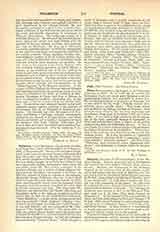

Fumo, BARTOLOMMEO, theologian, b. at Villon near Piacenza; d. 1545. At an early age he entered the Dominican Order and made great progress in all the ecclesiastical sciences, but especially in canon law. He was distinguished as an inquisitor at Piacenza, but is best known for his work, “Summa casuum conscientiae, aurea armilla dicta”. This work, which was dedicated to Bishop Catelan of Piacenza, went through many editions, the two most important and best known being those of Antwerp (1591) and Lyons (1594). It was held in high esteem by all the canonists of the time, especially because it contained, in brief and compendious form, a digest of all similar explanations since the thirteenth century. In one or two places, by a series of clear and clean cut sentences, he refutes all the errors of probabilism. The author-ship of the work has been disputed by one or two, but without reason. He is also the author of “Expositia compendiosa in epistolas Pauli et canonicas”, and a book entitled, “Poemata quaedam”. His first work, “Philothea, opus immortalis animi dignitatem continens”, was dedicated to Catalan before he became bishop.
H.J. SMITH

